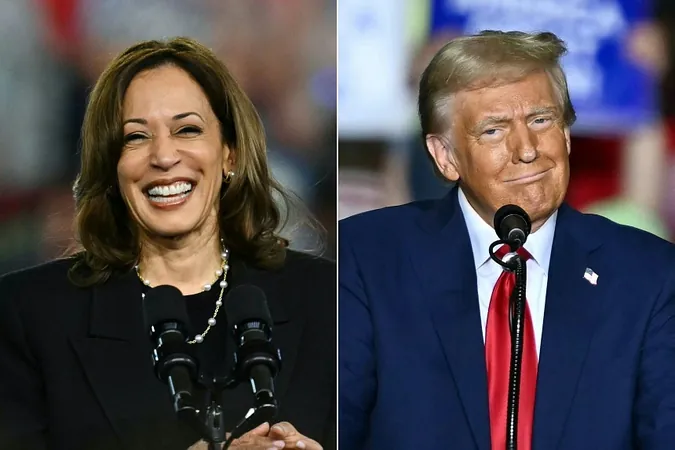
Kamala Harris Versus Donald Trump: Who Will Lead Asia into a New Era?
2024-11-01
Author: Ming
Introduction
As the world eagerly anticipates the inauguration of the 47th American president in January 2025, a significant event in international relations will also begin: the arrival of giant pandas in Washington D.C. This highly publicized event at the Smithsonian National Zoo, where the pandas are currently under quarantine, symbolizes the potential for renewed cultural exchanges between the United States and China. However, the backdrop of election uncertainty casts a shadow over U.S.-Asia relations, where tensions between the two superpowers have reached a breaking point.
Asian Perspectives on U.S. Leadership
With the upcoming elections, Asian nations are cautiously considering the implications of a potential Trump 2.0 presidency versus a Harris administration. Reports suggest that many in Asia view Vice President Kamala Harris as the preferable choice due to her anticipated approach to U.S. foreign policy. If Donald Trump returns to office, his previous trade policies and isolationist stance could reignite a trade war that would have disastrous consequences for Asian economies, especially those that rely heavily on China-centric manufacturing networks.
The Trade Dilemma and Regional Stability
Trump's threats of significant tariff increases may weaken Southeast Asian exports, causing heightened pressure for ASEAN nations to pick sides in the escalating China-U.S. rivalry. In contrast, Harris is anticipated to maintain a more collaborative and multilateral approach in line with President Biden’s policies, which could foster stability and predictability to U.S. relations with Asia.
Underlying Dynamics of U.S.-China Relations
Despite these differing approaches, experts suggest that neither candidate will significantly alter the underlying dynamics of U.S.-China relations. As Malaysian Deputy Minister Liew Chin Tong aptly remarked, the difference between Trump and Harris lies in "not of direction, but intensity." Both candidates must navigate a complex web of international trade, security alliances, and regional challenges that emerged in the wake of the Trump administration’s unpredictability.
Candidate Strategies on Taiwan and Allies
The question remains: what strategies will each candidate use in dealing with pivotal moments in U.S.-China relations, particularly around contentious issues like Taiwan? Trump has a history of transactional diplomacy that raises concerns about his commitments to allies in East Asia, while Harris is expected to continue the current U.S. policy of engagement.
Security Dynamics in Northeast Asia
South Korea and Japan find themselves at a crossroads, having to consider how each candidate's approach will reshape their security dynamics with the U.S. During his first term, Trump strained relations by pressuring these nations to increase their financial contributions for hosting U.S. troops. In contrast, Harris is likely to continue the trend of strengthening these alliances, as seen through Biden's historic trilateral summit with Japan and South Korea in August 2023.
Southeast Asia's Mixed Reactions
As for Southeast Asia, reactions are mixed. Nations like the Philippines anticipate that a Harris administration will uphold existing mutual defense agreements, particularly concerning territorial disputes in the South China Sea. However, optimism may be dampened under a potential Trump administration, whose focus on American interests could jeopardize regional stability.
India's Indifference
Interestingly, India appears relatively indifferent to the outcome, expecting either candidate to bolster U.S.-India ties as key components of a broader Indo-Pacific strategy aimed at countering China’s influence.
Pivoting Away from Reliance
Despite the uncertainty surrounding U.S. foreign policy, there are indications that Southeast Asian countries are already pivoting to reduce reliance on any one power, including the United States. With China emerging as a dominant consumer market, countries like Malaysia are investing efforts to integrate into the global supply chain, positioning themselves as essential hubs for multinational companies.
Conclusion
In summary, as Asia navigates the potential return of Trump or the continuation of Harris's policies, it is clear that regional nations prioritize stable and predictable U.S. engagement over the unpredictability associated with Trump's approach. Only time will tell how the election outcome will shape the future of U.S.-Asia relations in an increasingly complex global landscape. The question remains: will the arrival of special guests like the pandas serve as a turning point for improved diplomatic ties, or will it merely be a cute distraction from the challenging realities of geopolitics?


 Brasil (PT)
Brasil (PT)
 Canada (EN)
Canada (EN)
 Chile (ES)
Chile (ES)
 España (ES)
España (ES)
 France (FR)
France (FR)
 Hong Kong (EN)
Hong Kong (EN)
 Italia (IT)
Italia (IT)
 日本 (JA)
日本 (JA)
 Magyarország (HU)
Magyarország (HU)
 Norge (NO)
Norge (NO)
 Polska (PL)
Polska (PL)
 Schweiz (DE)
Schweiz (DE)
 Singapore (EN)
Singapore (EN)
 Sverige (SV)
Sverige (SV)
 Suomi (FI)
Suomi (FI)
 Türkiye (TR)
Türkiye (TR)